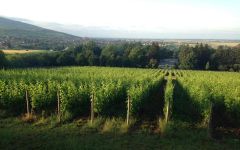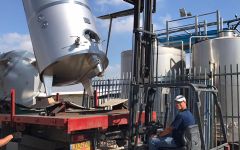Bravdo Cabernet Sauvignon (OK Kosher) 2014
-
Wilfred
Wong



Product Details
Your Rating
Somm Note
Winemaker Notes
The family's Cabernet Sauvignon vineyard has been planted for many years in a selected and unique plot that has been selected thanks to the optimal conditions for growing Cabernet Sauvignon. Heavy and rich limestone soil combined with the high temperature differences between daytime and nighttime, allow the Cabernet Sauvignon grapes a full expression of depth and power without being overripe. The wine is produced without filtration in prolonged natural shading
Professional Ratings
-
Wilfred Wong of Wine.com
COMMENTARY: The 2014 Bravdo Cabernet Sauvignon is charming and soft from the start and finishes with a good definition. TASTING NOTES: This wine shows complex notes of candied, black fruit and sarsaparilla. Enjoy it with simple meat stews. (Tasted: March 29, 2021, San Francisco, CA)



The winery is located in the heart of the Shuseyov family's vineyards, (who have been farming for over 130 years). The process of wine production always takes place immediately after manual harvest at dawn. The wine is produced according to the vast knowledge and experience accumulated by Professor Barbado and Professor Shoseyov in advanced technology that ensures high quality wines with an emphasis on aroma of the fruit.
The vineyards and winery are located next to the settlement of Karmei Yosef, on the lower slopes of the Judean Hills, on the way to Jerusalem on heavy limestone soil rich in stone. This land is known for its great compatibility with the growth of fine wine grapes since Solomon's reign. In the vineyard, trimming, thinning of clusters and shoots are carried out to achieve an optimal crop level, while monitoring the development of sugar, acid, color materials and minerals.
Strict adherence to the vine's growing conditions and adequate pruning allow for an appropriate ratio between the quantity of the landscape and the quantity of fruit, a ratio that ensures optimum ripening conditions of the cluster. In preparation for harvest, the vineyard is treated with dryness and exposure to solar radiation. This unique treatment ensures the receipt of high quality aromatic fruit.
The fermentation process is carried out at different temperatures to maximize the potential of the grapes at each fermentation stage. The wine is produced without filtering in long shading processes to ensure beautiful aroma and taste. The wine is then aged for 12 months in wooden barrels made mostly from French oak and a few of American oak to create a true combination between the aroma of the fruit and the smell of the barrel.

A noble variety bestowed with both power and concentration, Cabernet Sauvignon enjoys success all over the globe, its best examples showing potential to age beautifully for decades. Cabernet Sauvignon flourishes in Bordeaux's Medoc where it is often blended with Merlot and smaller amounts of some combination of Cabernet Franc, Malbecand Petit Verdot. In the Napa Valley, ‘Cab’ is responsible for some of the world’s most prestigious, age-worthy and sought-after “cult” wines. Somm Secret—DNA profiling in 1997 revealed that Cabernet Sauvignon was born from a spontaneous crossing of Cabernet Franc and Sauvignon Blanc in 17th century southwest France.

With a rich history of wine production dating back to biblical times, Israel is a part of the cradle of wine civilization. Here, wine was commonly used for religious ceremonies as well as for general consumption. During Roman times, it was a popular export, but during Islamic rule around 1300, production was virtually extinguished. The modern era of Israeli winemaking began in the late 19th century with help from Bordeaux’s Rothschild family. Accordingly, most grapes grown in Israel today are made from native French varieties. Indigenous varieties are all but extinct, though oenologists have made recent attempts to rediscover ancient varieties such as Marawi for commercial wine production.
In Israel’s Mediterranean climate, humidity and drought can be problematic, concentrating much of the country’s grape growing in the north near Galilee, Samaria near the coast and at higher elevations in the east. The most successful red varieties are Cabernet Sauvignon, Merlot, and Syrah, while the best whites are made from Chardonnay and Sauvignon Blanc. Many, though by no means all, Israeli wines are certified Kosher.
